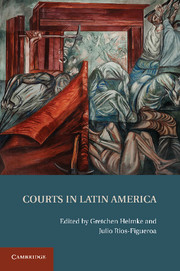Book contents
- Frontmatter
- Contents
- Contributors
- Acknowledgments
- Introduction
- 1 Institutions for Constitutional Justice in Latin America
- 2 Enforcing Rights and Exercising an Accountability Function
- 3 Strategic Deference in the Colombian Constitutional Court, 1992–2006
- 4 From Quietism to Incipient Activism
- 5 “Faithful Servants of the Regime”
- 6 Power Broker, Policy Maker, or Rights Protector?
- 7 Legalist versus Interpretativist
- 8 A Theory of the Politically Independent Judiciary
- 9 Courts, Power, and Rights in Argentina and Chile
- 10 Bolivia
- 11 The Puzzling Judicial Politics of Latin America
- Index
- References
6 - Power Broker, Policy Maker, or Rights Protector?
The Brazilian Supremo Tribunal Federal in Transition
Published online by Cambridge University Press: 01 June 2011
- Frontmatter
- Contents
- Contributors
- Acknowledgments
- Introduction
- 1 Institutions for Constitutional Justice in Latin America
- 2 Enforcing Rights and Exercising an Accountability Function
- 3 Strategic Deference in the Colombian Constitutional Court, 1992–2006
- 4 From Quietism to Incipient Activism
- 5 “Faithful Servants of the Regime”
- 6 Power Broker, Policy Maker, or Rights Protector?
- 7 Legalist versus Interpretativist
- 8 A Theory of the Politically Independent Judiciary
- 9 Courts, Power, and Rights in Argentina and Chile
- 10 Bolivia
- 11 The Puzzling Judicial Politics of Latin America
- Index
- References
Summary
The study of judicial politics in Latin America has boomed over the last two decades. While most theoretical debate has centered on the question of judicial decision making (e.g., Scribner 2004; Helmke 2005; Hilbink 2007), more recent work has sought to account for compliance with judicial decisions (e.g., Kapiszewski 2007; Staton 2010) and for courts' roles in social rights adjudication (e.g., Gargarella et al. 2006). The present volume gives content to the judicialization of politics and takes a broader view of courts and their consequences by focusing on the roles that high courts have played in postauthoritarian Latin America. This chapter examines the roles played by the Brazilian high court, the Supremo Tribunal Federal (STF). The analysis reveals that the STF repeatedly distributed power among the branches and levels of government, and among political actors, in the posttransition period and also participated in economic governance. However, the court played a less salient role in rights adjudication. Whereas Brinks (Chapter 5) examines the STF's decision making in these areas, the present analysis seeks to explain why the STF was called on to perform this particular mix of roles in the first place, although it also briefly addresses how it carried out each role.
- Type
- Chapter
- Information
- Courts in Latin America , pp. 154 - 186Publisher: Cambridge University PressPrint publication year: 2011
References
- 6
- Cited by



